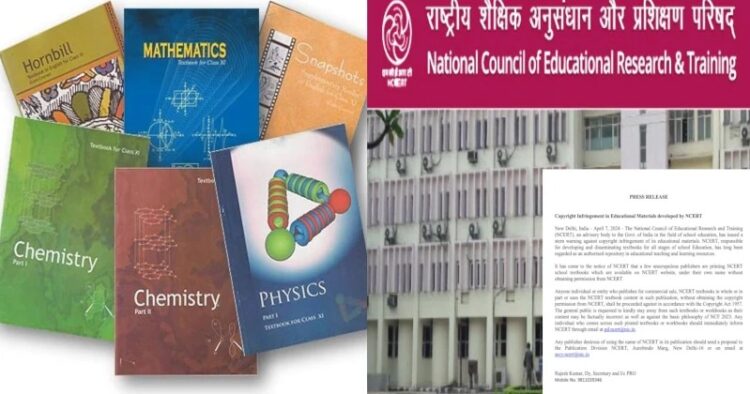The National Council of Educational Research and Training (NCERT) has issued a stern warning against copyright infringement of its educational materials. In an official notice available on X (Twitter), the NCERT has pointed out a few unscrupulous publishers who were printing NCERT school textbooks available on its website under their name without obtaining permission from the education body. These publishers are driven by commercial motives and reproduce NCERT’s material without permission by making slight modifications to avoid detection. Later on, they market these pirated versions at lower prices, undercutting the legitimate market for NCERT textbooks. In many cases, these pirated versions may contain errors or distortions, leading to misinformation and confusion among students.
NCERT has been responsible for developing and disseminating textbooks for all stages of school education and is an authorised repository of educational teaching and learning resources. It is notified that if any individual or entity is found to be publishing NCERT textbooks for commercial sale point of view or in part or uses the NCERT textbook content in such publication without obtaining copyright permission from NCERT, then strict action will be taken against them under the Copyright Act 1957.
The NCERT also requested the public to refrain from using such textbooks citing that the content may be factually incorrect as well as against the basic philosophy of NCF 2023. Any person who finds such fake textbooks can notify NCERT right away by email at pd.ncert@nic.in. On the other hand, publishers wishing to utilise the NCERT name may request permission by emailing secy.ncert@nic.in or sending a proposal to Publication Division NCERT, Aurobindo Marg, New Delhi-16.
Official notice on Twitter –
PRESS RELEASE – Advisory on Copyrights Infringement in use of Educational Materials designed and developed by NCERT is herewith released as public notice. Stakeholders are requested to honour the Copyrights Advisory issued by NCERT in letter and spirit.
Visit Here for more… pic.twitter.com/u05bEU5gBZ
— NCERT (@ncert) April 7, 2024
The National Council of Educational Research and Training textbooks are used widely and trusted by students and teachers for their quality and accuracy. However, the proliferation of unauthorised usage of NCERT’s textbook content by unfair and dishonest publishers has raised concerns regarding intellectual property (IP) rights and educational integrity. In response, NCERT has issued a strong warning to these publishers, signalling its commitment to safeguarding its educational materials.
NCERT textbooks hold a special place in India’s education system. NCERT textbooks are meticulously curated by subject matter experts to ensure accuracy and relevance to the curriculum. These textbooks are designed in such a way that they align with the Central Board of Secondary Education (CBSE) and various State boards prescribed curriculum. NCERT’s are known for their clarity of concepts, comprehensive coverage, and pedagogical effectiveness. Apart from this, NCERT textbooks are affordable, which makes them accessible to a wide range of students across India.
Other than students, teachers rely on NCERTs to deliver quality content and learning resources. Additionally, NCERT textbooks are often cited as references in various competitive exams.
Government agencies are required to strengthen enforcement mechanisms and enact stricter penalties for copyright infringement. Authorities can identify unlawful activity and defend the rights of content creators by taking tough measures against dishonest publishers and counterfeiters. Publishers have a responsibility to uphold ethical standards in their business practices and refrain from using NCERT-unauthorised material.



















Comments